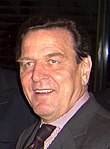German federal election, 1998
|
|
||||||||||||||||||||||||||||||||||||||||||||||||||||||||||||||||||||||||||||||||||
|---|---|---|---|---|---|---|---|---|---|---|---|---|---|---|---|---|---|---|---|---|---|---|---|---|---|---|---|---|---|---|---|---|---|---|---|---|---|---|---|---|---|---|---|---|---|---|---|---|---|---|---|---|---|---|---|---|---|---|---|---|---|---|---|---|---|---|---|---|---|---|---|---|---|---|---|---|---|---|---|---|---|---|
|
||||||||||||||||||||||||||||||||||||||||||||||||||||||||||||||||||||||||||||||||||
|
All 669 seats in the Bundestag 335 seats were needed for a majority |
||||||||||||||||||||||||||||||||||||||||||||||||||||||||||||||||||||||||||||||||||
| Turnout | 82.2% (voting eligible) | |||||||||||||||||||||||||||||||||||||||||||||||||||||||||||||||||||||||||||||||||
|
||||||||||||||||||||||||||||||||||||||||||||||||||||||||||||||||||||||||||||||||||

Party list election results by state: red denotes states where the SPD had the absolute majority of the votes; pink denotes states where the SPD had the plurality of votes; and light blue denotes states where CDU/CSU had the plurality of votes
|
||||||||||||||||||||||||||||||||||||||||||||||||||||||||||||||||||||||||||||||||||
|
||||||||||||||||||||||||||||||||||||||||||||||||||||||||||||||||||||||||||||||||||
German federal elections took place on 27 September 1998, to elect members to the 14th Bundestag, the parliament of the Federal Republic of Germany.
Since the German reunification on 3 October 1990, the unemployment rate in Germany had risen from 4.2% to 9.4% in 1998, with the Federal Labor Office registering more than 4 million unemployed. The unified Germany had to fight economic and domestic difficulties even as it actively participated in the project of European integration. Most people blamed the centre-right coalition government of the Christian Democratic Union/Christian Social Union (CDU/CSU) and the Free Democratic Party (FDP) for the economic difficulties. Longtime Chancellor Helmut Kohl's government was regarded by many as not having fully implemented the unification after eight years, in view of the mass protests in many eastern German towns due to job losses and social welfare cuts.
The 1998 campaign began with both the CDU and SPD questioning who would lead their parties. There had been rumours that Helmut Kohl would resign and allow Wolfgang Schäuble to take the reins of the CDU but these rumours were obsolete when Kohl announced in April 1997 that he would seek the chancellorship for a sixth term. The two contenders for the SPD nomination were Oskar Lafontaine, the party's chairman, and Gerhard Schröder, Minister-President of Lower Saxony.
...
Wikipedia





